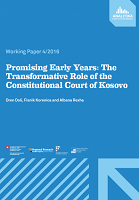Promising Early Years: The Transformative Role of the Constitutional Court of Kosovo
Promising Early Years: The Transformative Role of the Constitutional Court of Kosovo
Author(s): Albana Rexha, Fisnik Korenica, Dren Doli
Contributor(s): Edin Hodžić (Editor), Wojciech Sadurski (Editor), Mirela Rožajac-Zulčić (Editor)
Subject(s): History of Law, Constitutional Law, Politics and law, Transformation Period (1990 - 2010), Present Times (2010 - today), Court case
Published by: Analitika – Centar za društvena istraživanja
Keywords: Kosovo; Constitutional Court; politics; transformative role; jurisdiction;
Summary/Abstract: In constitutional democracies, constitutional courts are established in order to support the establishment and maintenance of democratic regimes, being devised as a last resort mechanism to protect both human rights and the integrity of constitutions. The leitmotiv behind the establishment of the constitutional courts in Austria and what was then known as Czechoslovakia, in the period between the World Wars, has traditionally been explained in this manner. According to Tushnet, many countries have established ‘[…] specialized constitutional courts on the German model, rejecting the older U.S. system of having the nation’s highest court for ordinary law also serve as the highest court for constitutional law’. Tushent argues that until the late twentieth century there were two ideas about the means of policy control that are arguably inconsistent with the constitution’s limits. The first ‘…was parliamentary supremacy which allowed for democratic self-governance surrounded by some institutional constraints on power-holders and many more normative ones. The second was judicial review, that is, the creation of a separate institution, removed from the direct influence of politics and staffed by independent judges charged with the job of ensuring that the legislature remained within constitutional bounds’. Constitutional courts, through the jurisdiction entrusted to them, have had direct impact upon the consolidation of newly-established democracies around the world. Vanberg notes that the constitutional review has become an inherent part of the constitutional democracies in many western states. While operating at the heart of politics, constitutional courts continuously face challenges that directly impact their work, including their independence. Boulanger, for example, argues that ‘…judges have to consider the political effects of their actions, they have to strategically choose opponents and allies, and this will in turn have an influence on their decisions. Starting from a rational choice approach, we can predict that no court will decide cases with complete disregard for daily politics.’ In that context, it could be reckoned that the final outcomes may be determined by both ideological and political motives. In light of this, Waluchow did not reject the possibility that the judicial review sporadically assists in confirming political decisions ‘…by judges pursuing, consciously or not, their preferred political agendas’. In this paper, however, we analyse whether and, if yes, how, the Constitutional Court of Kosovo has influenced and guarded the essentials of the nascent democracy. While we strive to assess the Constitutional Court’s role in the democratic transition of Kosovo, various external factors, such as political influence and the legitimacy of the Court, will necessarily be part of the equation. The first section of this paper briefly reviews the role of constitutional courts in transitional democracies, and identifies the common denominators which explain their endeavours to influence democratic developments. The second section focuses on the jurisdiction, functioning and organisation of the Court, and its relationship with public opinion. The third section analyses internationalised constitutionalism and its impact on the legitimacy and integrity of the Court in Kosovo. The fourth and fifth sections assess specific indicators, including the perceived level of confidence in the Court by political actors and the public at large, the role of international actors, and the perceived outside pressure on judges, doing so through analyses of the most notable cases and their impact upon societal and political life in the country. The final section provides a brief conclusion.
Series: ANALITIKA — Working Paper
- Page Count: 70
- Publication Year: 2016
- Language: English
- Content File-PDF
- Introduction

